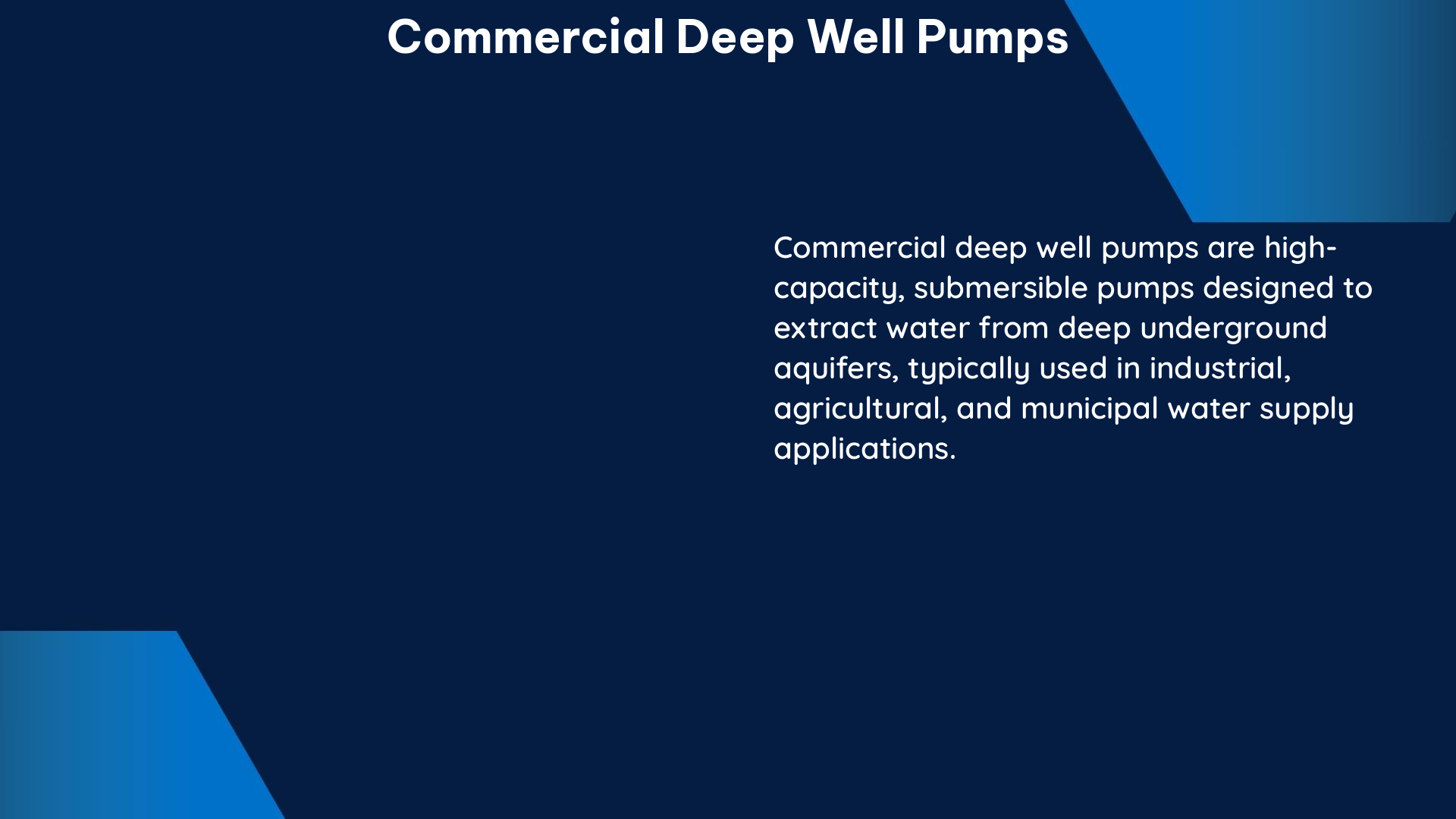Commercial deep well pumps are crucial for groundwater abstraction and have a significant impact on energy consumption in water collection systems. These submersible pumps are designed to operate in wells with depths ranging from 50 to 500 meters, with shaft input power ratings from less than 1 horsepower (HP) to over 200 HP, depending on the application and water demand.
Technical Specifications of Commercial Deep Well Pumps
-
Pump Design: Commercial deep well pumps are typically designed with a vertical shaft configuration, allowing them to be submerged in the well and discharge liquid in a plane perpendicular to the impeller shaft. This design ensures optimal flow rates and energy efficiency.
-
Power Range: The shaft input power ratings of commercial deep well pumps can vary significantly, from less than 1 HP to over 200 HP. The specific power requirement depends on the depth of the well, the desired flow rate, and the water demand of the application.
-
Pump Materials: Commercial deep well pumps are often constructed using corrosion-resistant materials, such as stainless steel or engineered plastics, to withstand the harsh underground environment and ensure long-term reliability.
-
Pump Stages: Deep well pumps can be single-stage or multi-stage, depending on the required head and flow rate. Multi-stage pumps are commonly used for deeper wells or applications with higher head requirements.
-
Impeller Design: The impeller design of commercial deep well pumps is optimized to provide efficient liquid transfer and minimize energy consumption. Impellers can be made of various materials, including cast iron, bronze, or engineered composites, depending on the specific application requirements.
-
Pump Efficiency: The overall efficiency of a commercial deep well pump is influenced by factors such as the impeller design, motor efficiency, and hydraulic losses within the pump. Manufacturers strive to optimize these parameters to achieve high overall pump efficiency.
Efficiency Measurements of Commercial Deep Well Pumps

-
Global Efficiency Curve: The efficiency of a commercial deep well pump is often measured using the global efficiency curve, which plots the pump’s efficiency against the flow rate. This curve provides valuable insights into the pump’s performance across a range of operating conditions.
-
Asynchronous Motor (ASM) Pump Efficiency: A study comparing the efficiency of an ASM pump found that it had a best efficiency point of 61% at a flow rate of 125 m³/h.
-
Permanent Magnet Synchronous Motor (PMSM) Pump Efficiency: In the same study, the PMSM pump reached a plateau for global efficiency at approximately 150 m³/h and higher, with a best efficiency point of 68% at a flow rate of 180 m³/h.
-
Efficiency Improvement Potential: The study found that adjusting the best efficiency point (BEP) of an ASM pump for wet period working points resulted in an 18% increase in global efficiency, compared to an 8%-point increase at dry period working points. This highlights the potential for performance optimization through BEP adjustment.
Performance Optimization of Commercial Deep Well Pumps
-
Best Efficiency Point (BEP) Adjustment: The performance of commercial deep well pumps can be optimized by adjusting the BEP to match the specific well field demands. This can lead to significant energy savings and increased efficiency.
-
Wet Period vs. Dry Period Performance: As mentioned earlier, adjusting the BEP of an ASM pump for wet period working points resulted in an 18% increase in global efficiency, compared to an 8%-point increase at dry period working points. This demonstrates the importance of considering seasonal variations in water demand when optimizing pump performance.
-
Pump Sizing and Selection: Proper sizing and selection of commercial deep well pumps are crucial for achieving optimal performance. Factors such as well depth, water demand, and system requirements should be carefully evaluated to ensure the pump is matched to the application.
-
Maintenance and Monitoring: Regular maintenance and monitoring of commercial deep well pumps are essential for maintaining peak efficiency and preventing premature wear or failure. This includes tasks such as impeller inspection, bearing lubrication, and vibration analysis.
Market Performance Data for Commercial Deep Well Pumps
-
Manufacturer Interviews: Obtaining market performance data through manufacturer interviews can provide valuable insights into the latest trends, technological advancements, and energy-saving capabilities of commercial deep well pumps.
-
Shipment Data: Analyzing shipment data for commercial deep well pumps can help identify market trends, such as the adoption of more efficient pump technologies, changes in power ratings, and shifts in customer preferences.
-
Industry Reports: Consulting industry reports and market research studies can offer comprehensive data on the commercial deep well pump market, including sales figures, market share, and growth projections.
-
Energy Savings Potential: Understanding the energy savings potential of commercial deep well pumps can help plant managers and water system operators make informed decisions about pump selection and operation, leading to reduced energy consumption and operating costs.
By understanding the technical specifications, efficiency measurements, performance optimization, and market data for commercial deep well pumps, plant managers and water system operators can make informed decisions that improve energy efficiency, reduce operating costs, and ensure reliable groundwater abstraction.
References:
– Increasing Energy Efficiency in Water Collection Systems by Submersible PMSM Well Pumps, 2018.
– Test Procedure for Commercial and Industrial Pumps, 2022.
– System, method, and computer readable medium for calculating well flow rates produced with electrical submersible pumps using measured voltage, current, 2012.
– A data-driven methodology to support pump performance analysis and energy efficiency optimization in Waste Water Treatment Plants, 2016.
– Deep Well Pump Market Technological Advancement 2024 to 2032, 2024.

The lambdageeks.com Core SME Team is a group of experienced subject matter experts from diverse scientific and technical fields including Physics, Chemistry, Technology,Electronics & Electrical Engineering, Automotive, Mechanical Engineering. Our team collaborates to create high-quality, well-researched articles on a wide range of science and technology topics for the lambdageeks.com website.
All Our Senior SME are having more than 7 Years of experience in the respective fields . They are either Working Industry Professionals or assocaited With different Universities. Refer Our Authors Page to get to know About our Core SMEs.